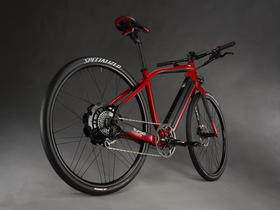Engineers at Purdue have created the most complex Rube Goldberg machine ever, using 300 steps to blow up and pop a balloon. It’s impressive and a cool machine, but what’s most amazing is that they spent so much effort building this enormously complex machine, only to do such an incredibly awful job of producing the video showing it in action!
Specialized Turbo e-bike
 Specialized Bicycles has unveiled a new electric-assist bicycle, the Turbo. Like other e-bikes, it uses an electric motor to supplement normal pedaling, offering both higher top speed and increased range. In this case though, it’s that top speed that’s a bit of a problem. It seems the aptly-named Turbo is just too fast to be legal in many places (like the US), topping out around 28mph. So for now, availability is limited to some areas of Europe, but it also seems that a simple design tweak could reduce its top speed to a more legal level for broader appeal.
Specialized Bicycles has unveiled a new electric-assist bicycle, the Turbo. Like other e-bikes, it uses an electric motor to supplement normal pedaling, offering both higher top speed and increased range. In this case though, it’s that top speed that’s a bit of a problem. It seems the aptly-named Turbo is just too fast to be legal in many places (like the US), topping out around 28mph. So for now, availability is limited to some areas of Europe, but it also seems that a simple design tweak could reduce its top speed to a more legal level for broader appeal.
More pictures can be found here, or check out the video below.
Centimeter-level location determination for portable electronics
 Broadcom has unveiled a new chip (the BCM4752) that can receive data from all four satellite navigation systems in orbit (GPS, GLONASS, SBAS, QZSS) to provide faster, more accurate results. Not only that, but it can also reference other radio signals, like wi-fi and Bluetooth, for example. Combine that with additional inputs from accelerometers, compasses, gyroscopes, and altimeters, and the result is an unprecedented ability to locate one’s exact position with potentially centimeter-level accuracy, even indoors.
Broadcom has unveiled a new chip (the BCM4752) that can receive data from all four satellite navigation systems in orbit (GPS, GLONASS, SBAS, QZSS) to provide faster, more accurate results. Not only that, but it can also reference other radio signals, like wi-fi and Bluetooth, for example. Combine that with additional inputs from accelerometers, compasses, gyroscopes, and altimeters, and the result is an unprecedented ability to locate one’s exact position with potentially centimeter-level accuracy, even indoors.
Some people freak out about this ‘big brother’ like capability, but the reality is that this is providing incredible information to the user. It’s how that information ends up being used that may or may not be Orwellian; I see so much potential is this level of detail that I remain optimistic that developers can find a way to provide this service to users in a way that protects privacy.
What is matter?
Nice video, talks about what matter really is from a quantum level:
The PowerPot
 Here’s a cool gadget that’s a bit counter to the ‘keep it simple’ philosophy. It’s a thermoelectric device buried under a pot, designed for backpacking use to charge your iPhone and other gadgets (you’re not really keeping it simple if you’re depending on those while backpacking!). So if you really can’t leave those gadgets behind when backpacking, this is the perfect solution to ensure they’re always fully charged. The alternative would be solar panels, though if you assume that you’ll be making a campfire regardless, then this might be more reliable than counting on sunshine. The inventors are currently seeking funding at Kickstarter; cost is $125.
Here’s a cool gadget that’s a bit counter to the ‘keep it simple’ philosophy. It’s a thermoelectric device buried under a pot, designed for backpacking use to charge your iPhone and other gadgets (you’re not really keeping it simple if you’re depending on those while backpacking!). So if you really can’t leave those gadgets behind when backpacking, this is the perfect solution to ensure they’re always fully charged. The alternative would be solar panels, though if you assume that you’ll be making a campfire regardless, then this might be more reliable than counting on sunshine. The inventors are currently seeking funding at Kickstarter; cost is $125.


